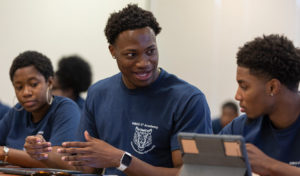NASHVILLE, Tenn. (TSU News Service) – Tennessee State University announced Wednesday a dual enrollment partnership that gives students in west and southern Africa access to digital resources to develop their technology skills.
The partnership with the African Methodist Episcopal Church will allow high school students to take a coding course at TSU to introduce or expand digital literacy on the continent. Eligible high school sophomores, juniors and seniors will have the opportunity to earn both university and high school graduation credits that will start them on the pathway to degrees in STEM.

“Tennessee State University is proud to be a part of this initiative that seeks to reach across international borders and give students an opportunity to expand their knowledge, and gain important career development skills,” said President Glenda Glover. “Coding and app design are a large part of the global workforce, and we want to help make sure people of color, everywhere, are equipped with the knowledge and skills to be competitive, and successful. These are largely high school students that have the potential to become a part of the TSU student body.”
Bishop E. Earl McCloud, Jr., of the 14th and 19th Episcopal Districts of the AME Church, presides over the partnering institutions in Africa: African Methodist Episcopal University and Monrovia College, both in Monrovia, Liberia, and Wilberforce Community College in Evaton, South Africa.
Bishop McCloud said the partnership brings hope to students and their families that see education as a better way of life, and most importantly for those with the greatest need.
“Years ago, the late President of the Republic of South Africa (The Honorable Nelson Mandela) said in his autobiography, ‘for Africans it is not a lack of ability, rather a lack of opportunity,’ when addressing the needs of African students,” said McCloud. “Tennessee State University has answered our clarion call to help provide more opportunities globally. This learning extension provides hope. It awakens the eyes of those often left out and left behind.”
President Glover and Bishop McCloud’s message of hope and the importance of access to digital literacy immediately resonated with families. In a collective statement, the partners described the reaction of one of the parents during the recruiting process.
“She walked in our office, with tear-filled eyes, telling us of how her son has always wanted to learn the computer and that his dream is to become a computer specialist, but she had never thought it would be possible because she is just a petite trader selling in one of our local markets. But she now sees it will be a dream come true. This is just one of the many dreams this program will make a reality. This is just one of the many lives this partnership has impacted.”
Participating students must be at least a sophomore in high school or in college. The online coding course is scheduled to start in the fall. Other related courses will be available provided students’ desire to continue with their educational studies through TSU.
“This partnership acknowledges TSU as a global education leader in empowering underserved populations around the world with education opportunities, the knowledge of digital literacies, the basic technical concepts and skills of coding, and the inspiration to innovate in order to be international competitors in the digital workplace,” said Dr. Robbie Melton, Vice President of the Smart Technology Innovation Center at TSU.
Dr. Johnnie C. Smith is executive director of Dual Credit/Dual Enrollment Partnerships at TSU and head of the Africa project. She said students will be provided with learning equipment and resources to ensure success.
“This is a great opportunity for international students to study at Tennessee State University,” said Smith. “I am pleased that President Glover and Bishop McCloud agreed to make this happen, and I am looking forward to expanding the TSU Dual Enrollment experience in other countries as well.”
The TSU-Africa partnership is part of the Smart Technology Innovation Center’s growing dual enrollment coding program that offers high school sophomores, juniors, and seniors the opportunity to earn college credits while enrolled in high school.
Tennessee school districts currently participating in the program include: Clarksville-Montgomery County, Cheatham County, Hamilton County, Haywood County, Jackson-Madison County, Lauderdale County, Metro Nashville Public Schools (MNPS), and Shelby County. Students also come from the states of Georgia, Maryland, Texas, Virginia and Washington.
The coding class is available to anyone interested in this field of study or as a one-time course. All high school students are welcome to be a part of the TSU Dual Enrollment program with course offerings from the Language Arts, STEM, and Liberal Arts. Please visit (https://bit.ly/3vnMFoO) for more information and to sign up for a class during the 2021 fall semester.
Department of Media Relations
Tennessee State University
3500 John Merritt Boulevard
Nashville, Tennessee 37209
615.963.5331
About Tennessee State University
Founded in 1912, Tennessee State University is Nashville’s only public university, and is a premier, historically black university and land-grant institution offering 39 bachelor’s degree programs, 24 master’s degree programs, and eight doctoral degrees. TSU is a comprehensive research intensive institution with a R-2 Carnegie designation, and has a graduate school on its downtown Avon Williams Campus, along with the Otis Floyd Nursery Research Center in McMinnville, Tennessee. With a commitment to excellence, Tennessee State University provides students with a quality education in a nurturing and innovative environment that prepares them as alumni to be global leaders in every facet of society. Visit the University online at tnstate.edu.
